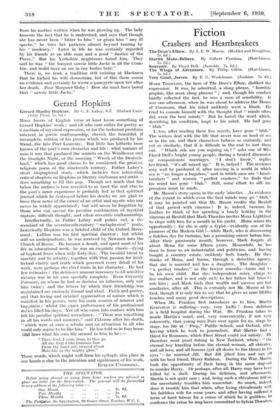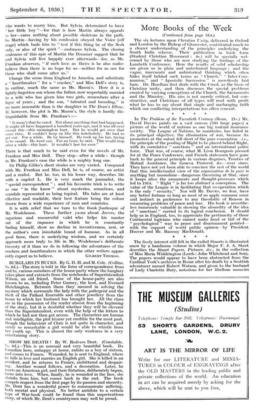Fiction
Crashers and Heartbreakers
Souvenir. By Floyd Dell. (Jarrolds. 7s. 6d.)
The Wings of Adventure. By Philip Gibbs. (Hutchinson.
7s. 6d.)
Very Good, Jeeves. By P. Cl. Wodehouse. (Jenkins. 75. 6d.) MARK TIIEWLISS, the hero of The Dean's Elbow, disliked the expression. It was, he admitted, a slang phrase, "horribly
graphic, like most slang phrases " ; and, though his conduct hardly reflected the fact, he was a man of sensibility. It was one afternoon, when he was about to address the House of Commons, that his mind suddenly went a blank. Ile tried to console himself with the thought that minds often did, even the best minds." But he hated the word which, describing his condition, leapt to his mind. He had gone " blah."
I, too, after reading these five novels, have gone "blab." The writers deal with the life that never was on land or sea or in the air, and their characters behave so curiously, and yet so similarly, that it is difficult in the end to sort them out. Which side are you arguing on ? " asks one of Miss Floyd Dell's bright young people, during a heated discussion on companionate marriages. "I don't know," replies her friend, "it's all mixed up." It is, indeed ! The reviewer may well be pardoned if, after moving in a world in which sex is "no longer a bugaboo," and in which men are " heart- breakers " and women "perfect crashers," lie finds that his mind has gone "blab." Still, some effort to sift im- pressions must be made.
Mr. Mason's story opens in the early 'nineties. As evidence of the extent to which even the best minds may go " blah," it may be pointed out that Mr. Mason credits the Bexhill of that period with cinemas ! It is, indeed, because he loathes to think of her spending a lonely holiday in the cinemas at Bexhill that Mark Thewliss invites Mona Lightfoot to elope with him for a month in his yacht. Mona seizes the opportunity ; for she is only a typist—evidently one of the pioneers of the Modern Girl l—while Mark, who is discovering a fadeless dye for curtains, has a promising career before him. After their passionate month, however, Mark forgets all about Mona for some fifteen years. Meanwhile, he has risen to fame as an industrialist and politician, and, having bought a country estate, suddenly feels lonely. He then thinks of Mona, and learns, through a detective agency, that she is married and has a daughter. The daughter- " a perfect crasher," as the lawyer remarks—turns out t9 be his own child. But she, independent minx, clings to her mother, and is not only rule to her father but tries ta rob him ; and Mark finds that wealth and success are but Mockeries, after all. This is certainly not Mr. Mason at his best, though it is only fair to say that he gives us some lifelike touches and many good descriptions.
When Mr. Frankau first introduces us to him, Martin Kenterton is suffering—very, very badly l—from delirium its a field hospital during the War. Mr. Frankau takes US inside Martin's mind, and, very conveniently, if not very coherently, that young man lives over again for us, stage by stage, his life at Prep," Public School, and Oxford, aftel leaving which he took to journalism. But Martin had is thirst for Romance, which Fleet Street could not satisfy. Hi therefore went pearl fishing in New Zealand, where—" tilt eternal boy kneeling before the eternal woman, all chivalry, and all love, and all honour (yet all desire to fan them) in his eyes "—he married Jill. But Jill jilted him and ran off with his best friend, Harry Ralston. During the War, Martin took the opportunity of their being in the same dug-out to murder Harry. Or perhaps, after all, Harry may have been killed by a shell. During his delirium, and afterwards, Martin is not quite sure ; and, being such a chivalrous fellow, the uncertainty troubles him somewhat. So much, indeed, does it trouble him that when, after living. chivalrously with his faithless wife for some years, and after having suffered a term of hard labour for a crime of which he is guiltless, he confesses the Crime he may have-committed to Sylvia Thwaltes, who wants to marry him. But Sylvia, determined to have ' her little boy "—for that is how Martin always appeals to her—cares nothing about possible skeletons in the path. So Martin—having by his confession obeyed the Voice [off stage] which bade him to "test if this thing be of the flesh Daly, or also of the spirit "—embraces Sylvia. The closing sentences of this epic of Martin the Dreamer suggest that he and Sylvia will live happily ever afterwards—for, as Mr. Frankau observes, "if such love as theirs is be also make- believe then there is no hope for us—neither for us nor for
those who shall come after us." •
Change the scene from England to America, and substitute a " heartbreaker " for a "crasher," and Miss Dell's story is, in outline, much the same as Mr. Mason's. Here it is a lightly-begotten son whom the father, now respectably married to a wife who has given him two girls, remembers after a lapse of years ; and the son, "talented and brooding," is no more amenable than is the daughter in The Dean's Elbow. If, however, the plot is Mr. Mason's, the style is hardly dis- tinguishable from Mr. Frankau's :— " It wasn't that he cared. Not about anything that had happened. It might all have happened a hundred years ago, and it was all over except this—this meaningless hurt. But he would get over that some time. It couldn't keep on Mos this indefinitely. He had to get out. For a while. Be by himself. He took up his hat, trying to be casual. he went out. For an hour, he said. This would stop after a while—this hurt. It wouldn't last for ever."
There is that much to be said even for the novels of Mr. Frankau and Miss Dell. They stop—after a while : though in Mr. Frankau's case the while is a mighty long one.
Sir Philip Gibbs's short stories are very varied. Compared with Mr. Frankau and Miss Dell, he is, of course, an artist and a realist. But he, too, in his lesser way, describes life with a capital L. He is very much the journalist, the " special correspondent " ; and his favourite trick is to write as one "in the know" about mysteries, sensations, and scandals represented as being topical. His tales are at least effective and readable, their best feature being the colour drawn from a wide experience of men and countries.
It is with relief that we turn to the frank (burlesque of Mr. Wodehouse. These further yarns about Jeeves, the sagacious and resourceful valet who helps his master nut of the impasses in which he is constantly finding himself, show no decline in inventiveness, zest, or the author's own inimitable brand of humour. As in all good farce, there is underlying wisdom, and we certainly approach more truly to life in Mr. Wodehouse's deliberate travesty of it than we do in following the adventures of the crashers and heartbreakers in which the other writers appar-































 Previous page
Previous page